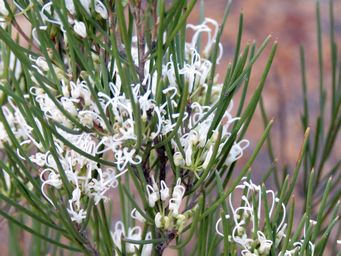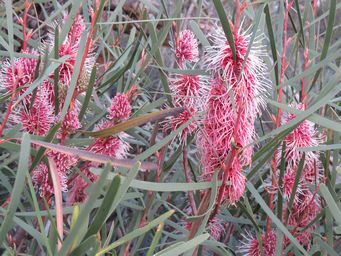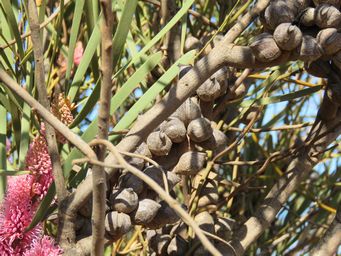Australia So Much to See



Spring, with the photo at right in April.
Bridgetown, South West Region, Western Australia and throughout the South West and Great Southern Regions, extending into the Wheatbelt and Mid West regions, and extending into the coastal strip between Albany and Esperance.



Hakea marginata
Small white Hakea flowers along the stems. Leaves are elongated elliptical and pointed to a spine at the
tip, on an erect or spreading shrub.
August
Kulin, Wheatbelt Region, Western Australia and is found in the Mid West, Wheatbelt, and Great Southern Regions, extending along the coastal strip to Esperance.
Hakea multilineata, Grass-leaf Hakea, djanja
Vivid pink clusters of Hakea flowers along the stems adjacent forming an elongated eye catching bloom on a tall shrub. Leaves are very long and narrow, with fine longitudinal lines, and a spine at the tip. Seed cones are small and rounded, with a short thick curved beak (horn) which has a groove at the top.
August
Hyden-Norseman Road, Dundas shire, Goldfields and Tarin Rick, Dumbleyung shire, and Wheatbelt Region, Western Australia. Can be found throughout the Wheatbelt, into the Mid West at Perenjori, and into the Goldfields region.



Hakea lissocarpha Honeybush, djanja
White, some pink tinges, shrub, flowers along stem which has spiny leaves. Can also occur
in pink. Pink tinges on these due to aging. Above left, hard seed pod approximately twenty millimetres long, with
two spikes at end (horns can also be close together). Above right showing seeds with sails.
Late Winter, Spring with a long flowering
season
Bridgetown, South West Region, Western Australia and throughout the South West, Wheat Belt and Great Southern regions and in
coastal areas from Kalbarri to Esperance







Hakea meisneriana (Identification not certain)
Creamy white flowers an open (not dense) shrub, which can reach up to three metres tall. Cones are small and rounded, with a thick base beak (or horn).
August, just commencing flowering.
Moorine Rock,
Shire of Yilgarn in the eastern Wheatbelt region, Western Australia. Found in the Mid West in the Three Springs shire, and the inland
Wheatbelt.




Without seeing fruiting (seed setting) stage, two similar species are possible for this shrub seen at Goomalling.
Hakea obliqua
subsp. parviflora, Needles and Corks. Hakea obliqua has two subspecies, with Hakea obliqua subsp. obliqua only found near to the south
coast.
A cream flowering Hakea shrub which can grow to three metres in height. Foliage cylindrical and around 1.5 to two millimetres
wide, with a length between two and 6.5 centimetres terminating in a sharp spine.
August
Hakea preissii,
Needle Tree, Needle Bush, Christmas Hakea, Tanjinn. Jarnock mert.
A cream flowering Hakea shrub which can grow to six metres in height. Foliage cylindrical and around 1.5 to two millimetres wide, with a length between one and three centimetres terminating in a sharp
spine.
August
Goomalling shire, Wheatbelt region, Western Australia. Grows widely from the southern Pilbara, through the
Gascoyne, Mid West, Wheatbelt, Great Southern and western parts of the Goldfields region.